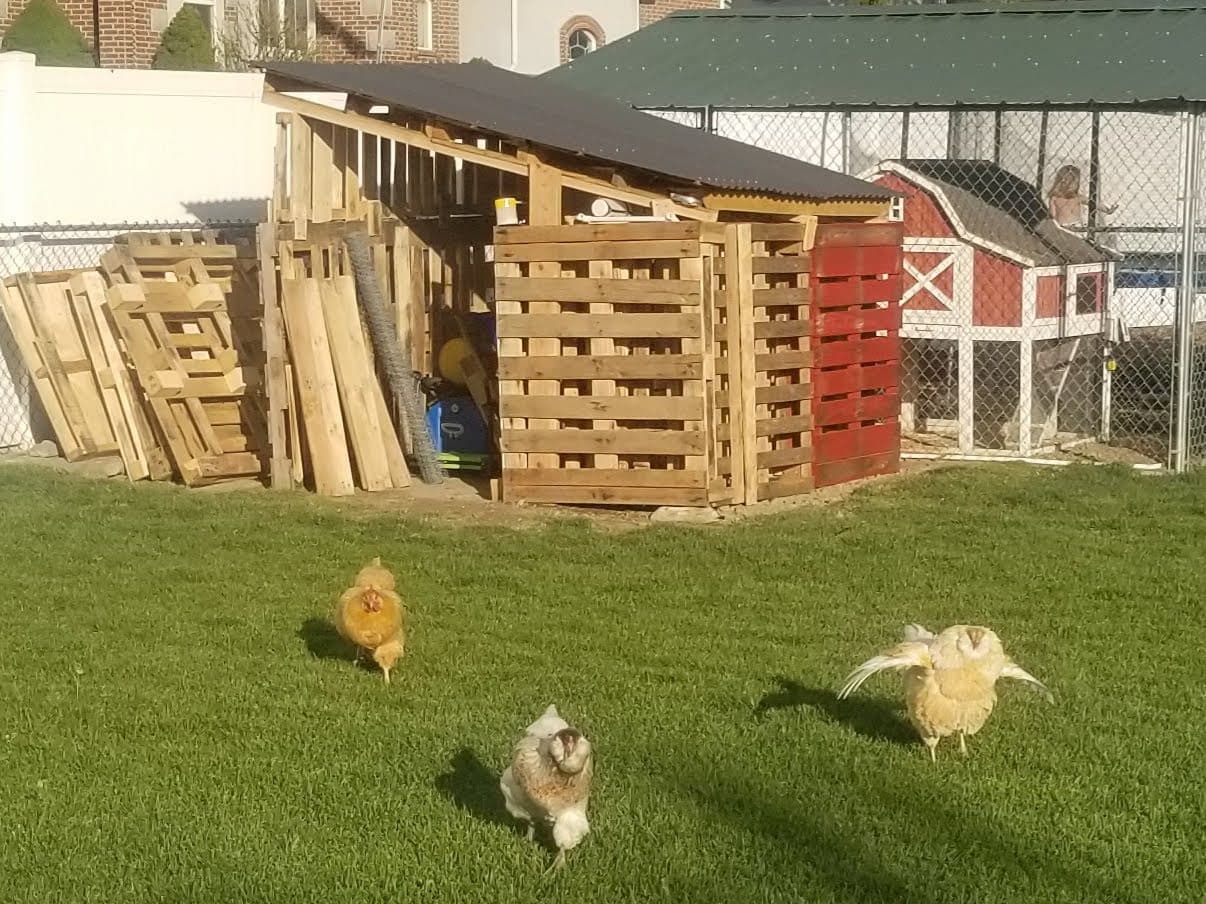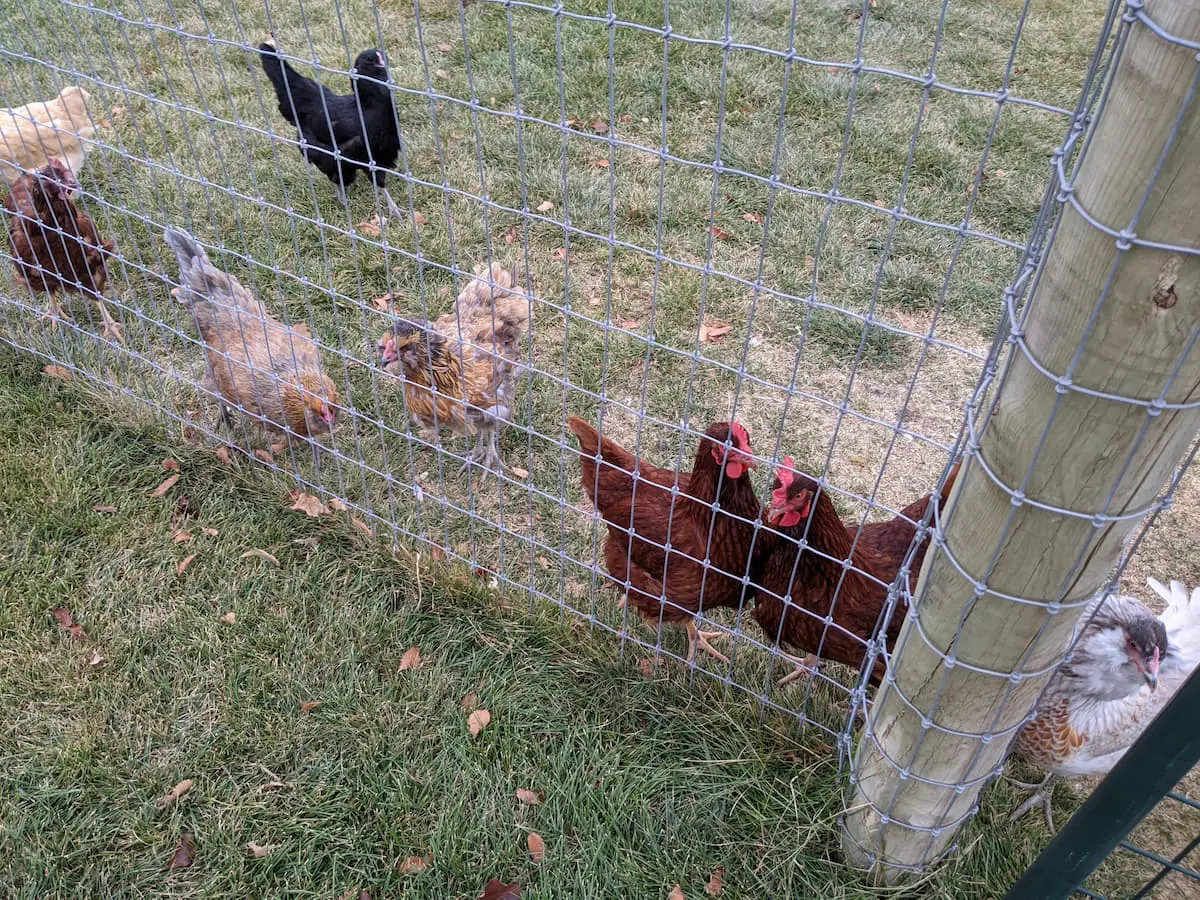When one of my friends first learned that we had chickens, she was equal parts excited (about scoring some fresh eggs) and worried (that chickens were a hot, noisy mess of an egg-laying pet. I knew that reassuring her that chickens aren’t terribly noisy (or problematic) wouldn’t work, so I invited her over to listen to the chickens.
Normal chicken noises are quiet and unobtrusive even if two people are next to them talking. Compared to noises from happy, playing children, chickens are ninjas. Louder chicken noises (from roosters or alarmed hens) are still quieter than screaming children, barking dogs, or a lawnmower.
Of all of the animals we’ve had, chickens have been the second-quietest species. The only ones quieter have been the fish. The goats were a lot louder. Even so, let’s take a look at how noisy chickens are – and what noises you can realistically expect of a backyard flock.

A 12-Month Chicken Sound Diary
Seriously, chickens aren’t super noisy. Well, hens aren’t super noisy. Roosters (male chickens) are noisier by evolutionary design. So if you want to have quiet chickens, it’s important to skip the rooster. There are also several noisier breeds of chickens.
However, even within each breed of chicken, you’re going to find that the individual personality of each chicken comes out strong. Some “quiet breeds” may net you a noisy hen full of personality. Or if you get a “loud” breed of chicken, you may end up with a shy, quiet hen.
Thankfully, we’ve got a mix of several breeds in our flock of a dozen chickens, so let me show you what the year usually looks like as far as chicken noises.
| Month | Sound Diary | Notes |
|---|---|---|
| January | Chickens are fairly quiet during the winter months. They’ll announce an egg being laid, of course. But as long as they’re safe, they’re pretty quiet. | You can increase egg production with artificial lights, but then noise will increase, too. |
| February | Chickens prefer to stay by their coop for warmth. They’re often inside it, which makes them harder to hear. | Chickens don’t usually neat heat lamps – unless there’s a huge drop in temperature. |
| March | Chickens are venturing out more. They’re still mostly quiet, although more sunlight means more eggs. And that means more egg-laying singing. | Isn’t spring wonderful? February and March are when we like to buy chicks to add to our flock. |
| April | Chickens are outside foraging as much as possible. As long as there’s no danger, they’ll cluck happily and sing when they lay an egg. We can’t hear them from the house – unless they manage to escape the run and strut up to our back door. | We have one particular hen who likes to peck on our back door after escaping the pasture. |
| May | We’re outside more now that it’s plenty warm. We can hear the chickens clucking happily, but they’re quickly drowned out by the sounds of happy children playing. | Our chickens will flock after any person – because to them, people mean treats. |
| June | We still can’t usually hear the chickens from inside the house. We can hear the goats from indoors, though. | We can sometimes hear an egg-laying cackle from indoors. |
| July | While in our yard, we can hear a rooster from somewhere in the neighborhood (we don’t know where exactly). He’s much louder than our hens – even though we’re right next to them. | Seriously. Roosters are loud. |
| August | As the hens reconfigure the pecking order, a few squabbles and some clucking are going on. But it’s only noticeable when we’re outside or listening to it while inside. | Chickens love their social order. They will get noisy to keep the status quo. |
| September | The hens get more free-range foraging, which means we can’t hear them from the house until they lay an egg. We can only hear that if we’re in a certain part of the house. | We can hear our chickens if they’re within about 20 feet of the house. |
| October | Our chickens are pretty good about watching for predators, but we can usually spot a hawk before they do. We’ve spotted one – and we go running out to round up the flock into the coop. They’re squawking and flapping and clucking at being herded up – until they finally notice the hawk, too. Then they beeline for the coop – and go ninja quiet. | October is when we let our chickens eat what’s left of the garden. Free chicken scratch tilling! |
| November | The hens are still laying, but total production (and the egg-laying singing) are less frequent. | Our chickens are busy bulking up weight and feathers for winter. |
| December | Even though cold carries sound, we only hear the chickens outside and next to the coop. The hens are back to staying close to the coop for shelter and warmth. They will venture out to explore in the snow sometimes, though. | We like to give our chickens some scratch to help them stay warm in winter. |
A few conclusions, then, from having a dozen chickens for the last few years.
- Chickens like to make some noise when they’ve laid an egg, no matter what time of year it is.
- Chickens are quieter during winter months – because they’re not going as far from their coop and run, even with access to pasture. They don’t like the snow while it’s falling – and they’ll stay quiet in hopes it goes away.
- Chickens will make some noise if they’re reconfiguring the social order. That’s normal. But it’s also done fairly quickly – and if you blink, you really might miss it.
- Chickens love foraging and clucking when it’s warm outside. And if you bring your chickens treats regularly, then they’ll all cluck and run towards you any time they see you. Even if it’s through a glass door and you’re still in the kitchen.
- If chickens are busy foraging and eating, then they’re not going to make much appreciable noise.
Seriously – chickens are amazing. And they do make some noise, but it’s not bad. I’ll tell you exactly what my neighbors think of our chickens later on in this article.
Do Chickens Make Noise?
Chickens make noise, yes.
- Happy chickens make a very quiet noise.
- Angry chickens make more noise.
- Chickens who just laid an egg make quite a bit of noise – they’re proud, dang it!
- Alarmed chickens make a lot of noise. This is both to warn the rest of the chickens to run for safety and in an attempt to scare off the danger.
- Roosters make the most noise of all. They crow all day, every day. They’re busy protecting their hens, trying to get attention, and showing off their mad rooster skills.
We don’t keep a rooster, because we don’t want that kind of noise.

Normal chicken noises are pretty quiet. I’ve got a friend who loves to come over and pick up eggs, let our kids play, and we have a good chat – all outside with the chickens. Okay, so she also likes to pet my chickens.
In any case, we’re totally able to have a normal conversation around the chickens. And they’re just being normal chickens – and we can have a normal conversation. Sure, we can hear the chickens. But they aren’t bothersome. In fact, the playing children are much louder than the chickens are!
Here is an example of how much noise our chickens make – courtesy of my YouTube channel. Seriously – if you haven’t subscribed, you’re missing out on some prime video footage from our backyard homestead. Go check this video I made on YouTube out (or click the image below) – and then make sure you subscribe.

Then, for comparison, feel free to check out this other video from my channel. This video is one where I’m talking about a specific feeder, but I chose it because it’s got the original audio – so you can hear exactly how loud the chicken is compared to me and the ambient wind.
I queued the video to start at a good spot to listen in, though you’re definitely welcome to watch the whole review.

And just for reference – the chicken being featured (her name is Chica – she’s my oldest boy’s chicken) is one of our louder chickens. The noises she’s making are both happy, feeding noises – and warning noises to some of the younger chickens to keep away from her treats.
Are Chickens Loud?
Chickens can be loud, yes. However, it’s important to know that “loudness” is measured on a relative scale.
- For example, my goats are louder than my chickens.
- Or my running washing machine is louder when I stand right next to it than when I’m in another room.
- My chickens are louder when they just laid an egg.
- Chicken noises are louder next to the coop than from inside the house.
So the overall loudness is going to depend on how close you are to whatever’s making the noise as well as what kind of noise it’s making.
Even so, chickens can be loud on some occasions. The four most common occasions that chickens could be considered loud are:
- right after laying an egg;
- when there’s an issue with the pecking order;
- if there’s a rooster involved;
- and any time there’s danger.
Chickens cluck and sing and make all sorts of noise right after laying an egg – and we’ll talk more about that particular noise in just a moment.
Chickens also make a good bit of noise – clucking, flapping, and whatnot – when there’s an issue with the pecking order. Remember when I mentioned our chicken Chica earlier? Yeah, she’s particularly loud when she’s putting another chicken back in its place on the chicken social ladder. She’s a bit of a bully, but she’s also the self-designated Head Chicken. So she thinks she gets to be as loud as she wants.
Roosters are also the loudest of all of the chickens. They’ve become that way thanks to evolution and social roles and whatever else. It’s their job to protect the flock, serve as the dinner distraction in case there’s no option of escape, make noise when they find food, and to generally show off to their girls.
Remember, though, that even a rooster’s “loudness” is relative. And while having a rooster is too loud for us, it’s not too loud for everyone.
For example, my sister-in-law keeps four roosters (and her hens) on a couple of acres. They’re usually out foraging, so when we go visit, they’re rarely heard. And they’re definitely not loud – we can barely hear them. So if you have a few acres, then having a few roosters may not be as big of a deal.
But if you’re on a half-acre like us? You may not want to risk it being too loud or obtrusive for your neighbors. Don’t worry – we’ll still get to what my neighbors think of how loud and noisy our chickens are. We’re getting there. But first – let’s talk about chickens, noise, and nighttime.
Do Chickens Make Noise at Night?
Chickens don’t make noise at night, no. Once it’s full dark outside, our chickens are asleep and ninja quiet. Any noises (or loudness) aren’t coming from them. In fact, sleeping chickens are not only silent, but they’re also pretty dang vulnerable.
In fact, if there is a noise coming from the chicken coop after dark, odds are it’s coming from a predator who’s making short work of whatever’s left in your coop.
I’ve read stories about various predators (rats, raccoons, you name it) that sneak into chicken coops at night specifically so they won’t have to worry about fighting an awake chicken. That and, you know, those particular predators are nocturnal.
So, no – chickens don’t make noise at night. If one does wake up enough to make noise, then there’s something seriously wrong in your chicken coop. You need to rescue whatever chickens are still alive as soon as possible.
So if you’d rather avoid nighttime chicken noise shenanigans, make sure your coop and run are predator-proofed. Then you won’t have to worry about nighttime chicken noises – or chickens getting eaten.
Why Do Chickens Make a Noise When Laying an Egg?
While I like to tell myself that my chickens are overly proud of having laid an egg (I mean, really – wouldn’t you be proud if you birthed a child every day? Talk about serious skills!), the reality is the exact opposite.
Chickens cackle, squawk, and cluck after having laid an egg so that you pay attention to them – and not the egg. That way, if there’s a predator around, then the egg will survive.
So while I’ve talked with my kids about the real, evolutionary reason that chickens cluck and make noise after laying an egg, we also talk about how each chicken is just that proud of another job well done. After all – we very much appreciate those fresh eggs! And, since we don’t have a rooster, those eggs aren’t actually going to hatch into another generation of chickens. They’re just eggs.
Will Your Neighbors Hear Your Chickens?
Your closest neighbors will most probably be able to hear the chickens. Depending on how close “close” is, they’ll likely be able to hear them when they’re outside. They may not be able to hear them when indoors, though.
Knowing that there are some noises associated with keeping chickens, we try to be proactive in controlling the chicken noises. And we try to keep good relationships with our neighbors. That way, everyone’s happy.
Whether or not your neighbors can hear your chickens depends on many factors, including how close the chicken coop is to a fence. Here are a few more of the noise-affecting factors.
- The size of your yard
- How close you are to your neighbors’ houses
- Where your coop is located in proximity to a house (yours or your neighbors)
- How many chickens do you have
- Hearing ability or differences of the neighbors involved
- Your mixture of hens and roosters
- If your chickens like to be noisy or not
- How observant your neighbors are
- If your neighbor is outside or if they’re indoors
We’re on a half-acre lot, and we’ve purposely put our coop in a spot that’s as remote as possible from our neighbors. We also only keep hens, although they do crow after laying eggs. No noisy roosters for us, thanks.
Even so, I’ve asked several of our neighbors (including several that are not right next door to us) about any chicken-related noise issues. Here’s what they had to say.
- Our closest neighbors can hear our chickens clucking when they’re working in their garden. They think it’s fun and cute. Some of them even lift their visiting grandchildren to peek at the chickens over the fence. Our closest neighbors can’t hear our chickens while indoors, even if they just laid an egg and are doing their celebratory cackle-crow.
- Some of our neighbors were surprised to learn we had chickens when I asked about the noise. So, obviously no noise issues there!
- Neighbors who aren’t immediately backing up to our yard report being unable to hear the chickens, even when they’re at their noisiest levels. Some of them even sounded sad about it – like they were missing out on something cool! (They’re totally missing out on something cool)
When we first got our chickens (and they’d started laying eggs), we took to a dozen fresh eggs to each of the neighbors. For us, giving away those few dozen eggs was an investment towards good relations with our neighbors. And it’s not like the chickens cared who got their eggs, anyway! But we felt better knowing that the chickens weren’t being too noisy for the neighborhood.
Final Thoughts
Chickens aren’t silent. They aren’t fish, after all. But when I compare the noise from our fish tank (the filter constantly turns over fresh water to oxygenate and clean the water) to that of our chickens, they’re actually pretty even on the loudness scale.
After all, from my computer right now, I can hear the fish tank. But I can’t hear the chickens, despite being on the side of the house where I’m most likely to be able to hear them. Granted, it’s still early – and they’re just waking up and heading out to forage.
Chickens aren’t loud, though, as long as you’ve got enough space and you’re allowed to have them.
So if you’re thinking about getting chickens, now you know that they aren’t crazy noisy. Here are the next steps to take before buying your coop, though.
- Make sure your local codes, laws, HOA covenants, by-laws, or zoning allow you to have chickens. Some areas limit how many chickens you can keep, so be aware of that fact, too.
- Talk to your neighbors and let them know your expectations about the noise. If you want, share this article with them so that they’ll know exactly what to expect. Think about offering them some fresh eggs as a fun incentive. Be willing to talk things out if the chickens do become a noise or smell issue. (Chickens shouldn’t smell – if they do, there’s an issue. But don’t worry – I’ve got this article for you on what to do about smelly chicken syndrome)
- Finally, begin your chicken adventures with some awesome chicken background noises. Be sure to bookmark this site (and my YouTube channel) for more answers to your commonly-asked chicken questions.
Ready to enjoy some cute chicken noises? You’ve got this. Chickens really aren’t too noisy – and they’re so much fun.
Related Questions
Do Chickens Need Toys? As long as chickens have plenty of space and the ability to self-entertain with foraging, they don’t need dedicated toys. For examples and information, be sure to read my article on chickens, toys, and entertaining your chickens.
How Long do Pullets Lay Eggs? Pullets, or “teenaged” chickens, can begin laying eggs at about 16 weeks of age. Eggs will become full-sized over the next few months. Read my complete guide to pullet eggs for more information.
Can You Raise Chickens with Goats? Chickens and goats can pasture share safely if they have separate housing and food. Chicken food is not formulated for goats and should be kept separate. Read my best 11 tips for raising chickens and goats together for more information.
